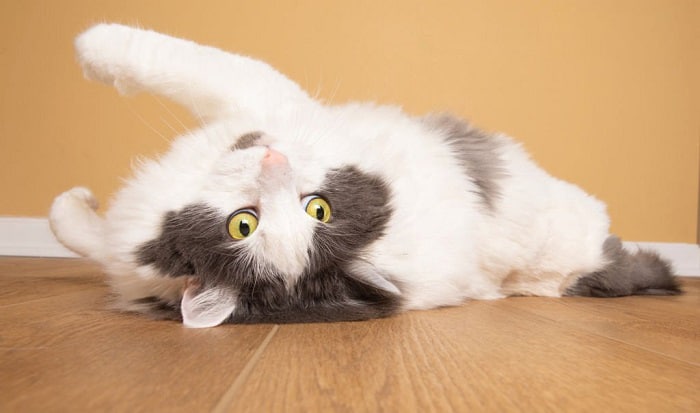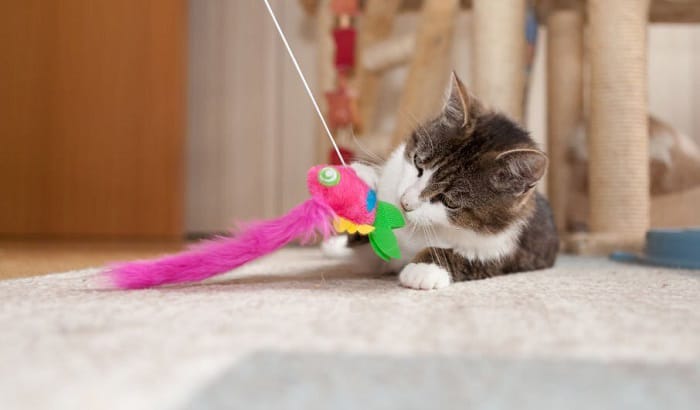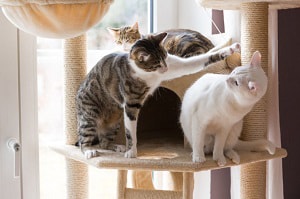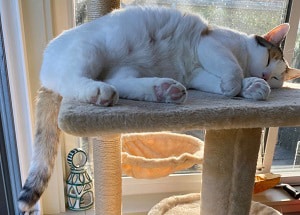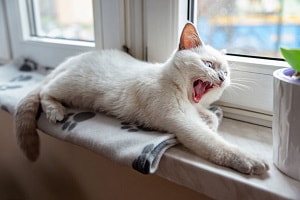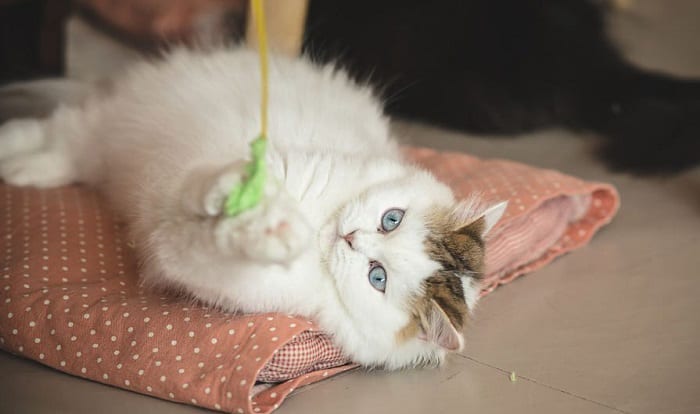We all love to play with our fur friends, and we know they love it, too! But have you ever wondered, “why is my cat so clingy, sometimes?”
When there is not enough physical or mental stimulation, pets start to lack confidence. This is concerning, especially when their behavior changes in a non-ideal way. After all, they need our comfort and support too.
Table of Contents
Understand Your Cat Behaviors: Why Are Cats Being So Clingy?
Unlike dogs, cats have a reputation for being aloof and independent. It may seem like they are not playful, but studies reveal they only reflect how people treat them.
This is why it is crucial to form strong bonds with them to make them feel comfortable around us.
Like other pets, cats need our love and affection as well. We see this especially when a cat is too clingy. It might be lumped in with being “demanding,” but it is important to distinguish one from the other.
A demanding cat will do anything to get what they want.
They may jump on your lap even if you are working on your computers, aggressively make noise that disturbs you, and similar.
How do we know if your pet cat is clingy? Below are some signs:
- Follows you all over, wherever you go inside the house
- Sits on you or jumps on you and rubs on you constantly
- Meows or cries non stop when you close the door on them
- Refuse to eat or drink like normal without your presence
- Demands to be pet all the time
Now that we have identified the signs, what does it mean when your cat is clingy? Let us identify the possible reasons for needy cat behaviors:
1. There are mommy issues
For new cat owners, you may be thinking, “why is my kitten so clingy?” A clingy kitten is usually a result of being separated from its mother too early. It has trust issues. It probably has the impression that you are its actual mother, resulting in the strong sense of bond it created with you.
2. They were rescued
Cats that were rescued can also have trust issues. This happens even in its younger years when it has experienced trauma. The latter can be in the form of abrupt separation from its mother or in the form of abuse. Previous owners may have inflicted violent actions on the cat. So, the cat may have learned to keep trying to get on your good side to avoid abusive behavior.
3. They are new
Being new in a home, cats may feel out of place or insecure. So, they stick close to you, following you like a shadow in the morning and even at night. Your presence soothes them and treats you like a protector.
4. Health issues
Your fur friend was previously independent and doing well. But all of a sudden, you notice changes in its behavior and have become clingy. It may have some medical issues. It is best to take it to a veterinarian for a checkup.
5. They are nervous and insecure
Physical changes around the home, like moving furniture or installing new carpets and rugs, can cause intimidation and insecurity to your cat.
6. New Family Members
When a new family member or a pet is introduced to your home, this can be stressful for your cat. A clingy cat meaning might be that it prefers to be by your side. Allow your pet to adjust to these changes. It may take time, so be patient.
7. Boredom
A cat being so clingy may also be the result of boredom. You will notice this when it suddenly becomes clingy or resorts to destructive behavior.
8. Hormonal Changes
Fluctuations in hormones as a result of pregnancy or being in heat can also make a cat so needy. During a heat cycle, cats can be so clingy and vocal. After being spayed, however, your cat will become calmer because her hormones are no longer fluctuating.
9. After Giving Birth
Mother cats are fiercely protective of their kittens. They only want a warm, quiet, and safe environment for themselves and their young. This mood and behavior cause her to be clingy as she only wants to be surrounded by those that emit a soothing aura.
10. Growing Old
For those with senior cats, you may be wondering, “why is my cat attached to me?” You might have seen similar questions on Reddit where other cat owners have the same problem.
These changes in behavior may be part of feline cognitive disorder (FCD). This affects your cat’s memory, senses, awareness, and even behavior towards owners. Some old cats become overly clingy and dependent on you. This is quite common, so you don’t have to stress out so much.
How to Deal With a Clingy Cat
Having a cat that loves to cling to you may be a cause of concern for some owners. This holds true, especially if you need to work or do chores and your pet keeps disturbing you.
Here are some tips you can use to address this behavior and keep both you and your feline friend happy and comfortable.
1. Make them feel secure
As cats want to be as close to you as possible, you can rearrange their bed, scratch post, or another area. You can place this in your room or near your work area. This allows them to feel secure, and you can also monitor their behavior.
2. Be consistent with reacting to attention
Even while cuddling and playing with your pet, look out for your reactions. Reward your cat when they behave in a positive way.
Ignore them when you dislike their actions. In this way, you can train them to only approach or act a certain way with you.
3. Expand the cat’s world
There are times when you have to leave home, including your pet. To avoid creating separation anxiety, which is quite common for pets, allow your cat to play outside.
When they are exposed to a different environment, including playing with other animals, it improves their confidence. They learn to be more independent and so will not be lonely or anxious when you are not around.
4. Distract them
Similar to letting them play outside, you can also opt to distract them when you are leaving for work or errands. Do it in a discrete manner to avoid stressing out when they keep latching onto you.
Give them treats far from the main door before you exit, or let another person in the household and play with the cat first.
5. Seek the veterinarian’s help
In some cases, this clingy behavior can be a cause for alarm. Visit the veterinarian and have them check the health of your cat. This goes for physical examinations and laboratory tests. Sometimes, illnesses can cause these feelings of sadness and anxiety in your cat.
Aside from the physical tests, the veterinarian may also ask about your cat’s history.
- How you got it
- What was the relationship like with the mother
- If there were experiences that may have caused this behavior.
Your pet’s emotional development greatly contributes to its responses and actions.
Therefore, the more information you provide, the better. The medical expert can better assess your cat and offer medical advice and proper treatment to address such a problem.
Conclusion
Playing with your cat allows you to relax or take a few minutes off from your busy schedules. However, when you start distancing yourself from your cat, it may become too needy.
You will start thinking, “why is my cat so clingy?” Lack of affection, comfort, and support are the main reasons. This is why you must pay attention to your pet’s needs and seek professional help when the clinginess turns overwhelming. After all, cat owners only want the best for their feline friends.

I am Amy Sawy, a Doctor of Veterinary Medicine (DVM) graduate from the University of Kansas. y husband, Dr. Plummer, and I own a veterinary clinic in Phillipsburg, Kansas. In addition to my professional background, I am a devoted pet owner myself, with a household that includes dogs, rodents, and most notably, cats – a total of five felines in my home.
In 2020, I joined an organization as a professional writer, leveraging my experience and collaborating with my team to deliver the most valuable information for your cat’s care.


